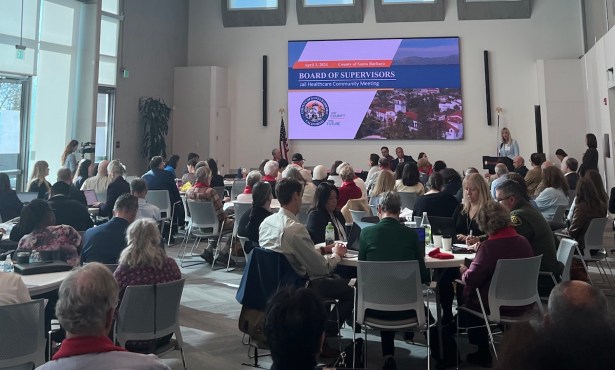‘Ex-Vaxxers’ Speak Out Against New Regulations
Parents Voice Concern over California’s Stricter New Childhood Immunization Laws

More than 70 moms, dads, and community members packed the Faulkner Gallery Sunday evening to discuss what has become a taboo and politically charged topic: childhood vaccines. Most of the parents in attendance were against vaccinating their kids and came to ask the three panelists how the recent laws tightening California’s childhood immunization requirements would affect their families.
“We’re here because our rights have been taken away,” said the moderator, Dr. Hesu Whitten, about Senate Bills 714 and 276. Whitten is a chiropractor based in Santa Barbara. “We are doctors and college graduates; we’re not just people sitting around on a porch picking our teeth.” The “we” Whitten refers to are anti-vaxxers, or the terms they prefer, “vaccine-educated” or “ex-vaxxers.”
“We don’t like the term ‘anti-vaxxer’ because 90 percent of the people in this group listened to our doctors and believed in vaccines until something went terribly wrong and we were forced to do the research ourselves,” Whitten explained.
The panelists, Dr. Doug Mackenzie, now a plastic surgeon but previously a flight surgeon in the National Guard; Dr. Shannon Kroner, psychology and special education double major with extensive experience working with special-needs children; and Laira De la Vega, an author and human rights activist, spoke for an hour about the dangers they perceive vaccines pose and then spent another hour answering any related questions from the crowd. Although the event was meant to be a debate with those with opposing views, it didn’t appear any “pro-vaxxers” attended.
“I understand that the health of their children is important to [parents] and is driving their fear of vaccination,” said Dr. Henning Ansorg, health officer for the Santa Barbara County Public Health Department. Ansorg was not at the meeting, but said in an interview that the parents’ fears are misguided. “These parents are forgetting what measles looks like,” he said. “Of course some children need medical exemptions, and they will get them. But overall the risk of measles far outweighs the risk of a bad vaccine reaction.”
The panelists addressed what they called common vaccine misconceptions, such as the validity of the studies and test trials done on vaccines before they’re administered. The panelists said none of the vaccines have ever undergone double-blind, placebo-controlled clinical trials, otherwise considered the “gold standard” of medical research.
They are partially correct. While some vaccines, like Gardasil, have had such a study with a saline solution injection (a true saline-only placebo as well as the aluminium adjuvant), many vaccines haven’t and instead are tested against a comparable vaccine that already exists. According to the National Center for Biotechnology Information, it is unethical to use a saline placebo when a similar vaccine already exists because the children receiving the placebo are left to potentially contract the disease the vaccine sets out to prevent.

But for parents who believe vaccines are responsible for their children’s injuries, and sometimes even their deaths, a saline placebo is the only viable way to ensure the vaccines are truly safe.
“We believe in science, but we also believe in mothers,” Whitten said. “Mothers essentially spend every hour of every day with their child. They know every nuance, every sound, every look. You become intimately connected with the nonverbal communication of your child, so when a mother says, ‘My child was perfectly healthy and making eye contact, smiling, giggling, and interacting, but then they got a vaccine and that night or the next day something happened,’ that’s a significant testimony.”
They also pored over the National Vaccine Childhood Injury Act of 1986, which freed manufacturers from any liability in the case of injuries resulting from the vaccines. The safety of vaccines is a misconception in itself, panelist De la Vega said, because manufacturers were getting sued “left and right” by parents whose children were injured before 1986 to the point they had to shield themselves with the legislation.
“There are no other medications that I am aware of that are liability-free,” De la Vega said. “The only one I know of, as far as pharmaceuticals go, are vaccines. … If anything happens to yourself or your child, anything of that nature, you cannot sue the manufacturer. … We have basically been test subjects the entire time.”
They cited a slide from Learn the Risk, a nonprofit that aims to educate about the risks of vaccines, which said that today’s kids are required to get 72 doses of vaccines, as opposed to the only 24 doses required in the early 1980s before the National Vaccine Childhood Injury Act of 1986 came into effect.
The panelists are correct that children today receive significantly more vaccines than their parents who grew up in the ’80s, and they are correct that the law relieves manufacturers of all liability — but the number of required doses they cite is inflated. There are actually about 54 doses currently required, so they likely came up with the number 72 by counting the DTaP, MMR, and Tdap vaccines as three separate doses, although they are only administered as a single dose now.
The reason for the dose increase, manufacturers say, is because improved medical research has led to the creation of more vaccines. The panelists charge that the increase is driven by money, and because manufacturers can’t be held liable for any injuries they will continue to increase doses, which will in turn increase their revenue with zero chance of any lawsuits.
“There was never any awareness in medical school that there was even a controversy about vaccines,” Dr. Mackenzie said. “We just took it as gospel. And later I came to realize the word ‘gospel’ is probably apropos because the vaccine paradigm is one where you’ll find faith and fear. It’s theology-based; it’s not science based. … I know pediatricians who don’t even know what the VAERS reporting system is.”
The system Mackenzie is referring to, the Vaccine Adverse Event Reporting System (VAERS), is a database that keeps track of vaccine-related injuries and deaths. It’s co-managed by the Centers for Disease Control and Prevention and the U.S. Food & Drug Administration and is meant to analyze reports of adverse effects from vaccines. The problem with the system, he said, is that less than one percent of incidents are actually reported, and many doctors tell parents that their child’s reaction was a coincidence and not a legitimate reaction.
Although it is impossible to confirm if the less than one percent statistic is accurate, anecdotal reports confirm parents and doctors have disagreed over whether vaccines were responsible for their child’s illness or disability. Local Santa Barbara stories can be found here.
Moms in the audience asked the panelists what they can do to keep their kids in school, as the new Senate Bills 714 and 276 allow stricter state oversight of medical exemptions for vaccines required to attend public and private schools. Some parents have already been told they can’t re-enroll their children without proof of vaccination. Panelist Kroner shared her plan to pursue a federal religious exemption law, allowing parents in any state to opt out of vaccines for religious reasons rather than medical ones. Personal-belief exemptions were banned in California in 2015.
“Primarily, the Democrats voted for these bills,” Kroner said. “I can tell you that I’ve been a Democrat my entire life, but when I saw the Democrats were not listening to parents up at the Capitol, I was no longer a Democrat. So first, we need to vote in Republicans because they are listening to us.… Second, I started something called the Religious Exemption Protection Organization (REPO). I’m putting together a religious coalition of all faiths to go after the religious exemption and ultimately get a federal bill that will grant us a blanket religious exemption federally.”
The group plans to hold forums on a monthly basis and hopes that people with opposing views will come to learn more. The location and date of the next meeting will be posted here.




You must be logged in to post a comment.